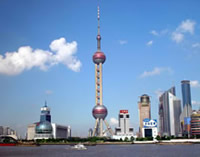|
|


ADVERTISEMENT
Buy Your own advertising
spaces!
.
Download Adobe Acrobat Reader to open [PDF] files.
Recent Visitors
USA Pavilion at World Expo Lets Down USA
2010. 27 August
by Abe Sauer
(brandchannel.com) The World Expo is China is now half over. However, the reviews are already in on the United States' presence at the event. In a word: Overbranded.
Secretary of State Clinton choked back her dislike for the USA pavilion, managing only a compliment of "It's fine." That was in May, just after the event opened.
Now, more and more reports are streaming in about America's presence, and they are less than kind. The one thing they all have in common is a criticism of the USA, showing as overly corporate and too branded. At an expo meant to show the world a country's best face, what does this say about the nation?

The USA pavilion is a 6,000 square foot "grey steel structure" boasting the theme "Rise to the Challenge." The challenge? Putting a corporate logo on every possible element. Even the pavilion's "no smoking" signs carry a Pfizer sponsorship.
A CNN Money correspondent asked, "Aren't we more than just a collection of giant corporate entities and politicians?"
Kenya Davis-Hayes, an American studies scholar at USC's Annenberg School, blogged about her disappointment in a post titled "Welcome to the US Pavilion: We're here to disappoint."
Rather than present corporate America, Kenya observed, "With the Expo theme of 'Better City, Better Life' the US Pavilion had limitless opportunities to construct for its audience the American experience through the lens of its cities."
American Public Media Marketplace's correspondent also commented, "More than 50 American corporations donated $61 million to fund the U.S. Pavilion. A wall of their logos is the first thing you see when you enter, and a gallery of corporate exhibits guards the exit." Though the correspondent added that he coudn't find a Chinese critic.
To be fair, the USA pavilion organizers were hamstrung. Due to some truly questionable legislating, the federal government was legally prohibited from funding the USA's Expo pavilion. With a recession slamming private donations, the pavilion's only hope was brand sponsorship.
The great irony of course is that the pavilion's heavy brand representation is itself negatively branding the country it's meant to represent. While the old maxim that America is an economy, not a nation, is often repeated, it might serve that economy's brand better to at least appear to be a nation, economically speaking of course.
(Editor's note: For more on this topic, check out the USC Center for Public Diplomacy's Shanghai Expo website for videos, blog posts and differing points of view - such as this piece by the CPD's Jay Wang - on how America's nation branding efforts in Shanghai compare to other countries' approaches. The CPD's YouTube channel and Facebook page continue the conversation — check them out.)



Bob Jacobson says:
says:
You offer a nice synthesis of prevailing opinion, but you are wrong about the organizers being legally handicapped with regard to funding. THERE IS NO LAW PROHIBITING FEDERAL FUNDING OF US PAVILIONS AT WORLD EXPOS. And the "organizers" were actually pirates.
That was a Big Lie promulgated by the Bush Administration and maintained by the Obama Administration to cover for a deliberate policy to privatize the US Pavilion and American public diplomacy in general. The Congress could have appropriated the necessary $30 million or so (what a good pavilion should cost) at any time. But it was never asked by either Administration. It's so much easier to horse trade political and financial favors when the public isn't involved.
In 2007, the State Department issued an RFP. A world-class team of Expo veterans, all volunteers (to which I was apprenticed) "won" the year-long competition. But State abruptly aborted the RFP and two months later awarded the assignment to inexperienced political insiders in a secret process without public notice, competition, or review. It's now on record.
The story goes downhill from there, including potential tax fraud, conflict of interest in the contracting for elements of the pavilion, and malfeasance on the part of the Shanghai Consulate including coercing the Chinese hosts to provide seed capital and bailout money for the continuously faltering effort and preventing other Americans from supplementing the failed team.
Clinton was told about the Bush abnormalities but continued the process unabated. That's why the US Pavilion turned into a six-month multinational infomercial, tax exempt and therefore at the expense of the US Treasury. So effectively, we ponied up public money anyway!
You can read more about this incredible dark side:
"A Sorry Spectacle," Adam Minter, Foreign Policy, March 8, 2010
www.foreignpolicy.com/.../a_sorry_spectacle
"'Blackwatering' Public Diplomacy: The US Pavilion at the Shanghai Expo," Bob Jacobson, Huffington Post, May 3, 2010
www.huffingtonpost.com/.../...planni_b_561697.html
"US Pavilion A Stalking Horse for Privatization? Complaint to the IRS Challenges Tax Exemption," Bob Jacobson, May 18, 2010
www.huffingtonpost.com/.../...r-priv_b_580086.html
Many reports on Shanghai correspondent Adam Minter's well-regarded blog, Shanghai Scrap (as in iron), that discuss allegations of criminal activity and simple bad taste:
http://shanghaiscrap.com/?cat=38
The Senate and IRS may be conducting investigations before the Expo ends in October.
Interested parties are invited to get in touch with me for further information. Experts familiar with the situation hope that similar problems can be averted at Yeosu, Korea 2012 and Milan 2015 by a return to public funding of the US Pavilion. The aberrations that occurred over the last three years have soured everyone's taste for privatization.
However, the danger of "overbranding" and mediocrity still exists. If the government's finances worsen even more, public diplomacy as we've known it is doomed. And as the only alternative to war, that's not good for anyone. Here's to a better future.
August 27, 2010 02:36 AM #